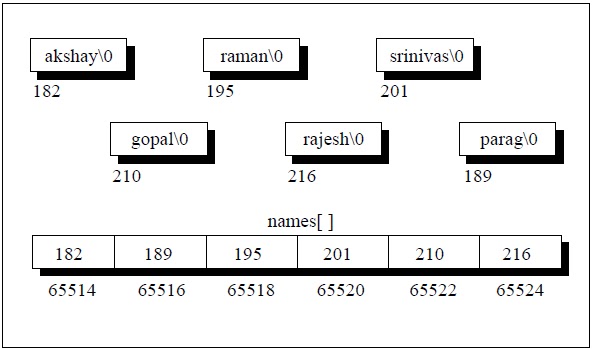As we know, a pointer variable always contains an address. Therefore, if we construct an array of pointers it would contain a number of addresses. Let us see how the names in the earlier example can be stored in the array of pointers.
char *names[ ] = {
"akshay",
"parag",
"raman",
"srinivas",
"gopal",
"rajesh"
} ;
In this declaration names[ ] is an array of pointers. It contains base addresses of respective names. That is, base address of “akshay” is stored in names[0], base address of “parag” is stored in names[1] and so on. This is depicted in Figure
In the two-dimensional array of characters, the strings occupied 60 bytes. As against this, in array of pointers, the strings occupy only 41 bytes—a net saving of 19 bytes. A substantial saving, you would agree. But realize that actually 19 bytes are not saved, since 12 bytes are sacrificed for storing the addresses in the array names[ ]. Thus, one reason to store strings in an array of pointers is to make a more efficient use of available memory.
Another reason to use an array of pointers to store strings is to obtain greater ease in manipulation of the strings. This is shown by the following programs. The first one uses a two-dimensional array of characters to store the names, whereas the second uses an array of pointers to strings. The purpose of both the programs is very simple. We want to exchange the position of the names “raman” and “srinivas”.
Another reason to use an array of pointers to store strings is to obtain greater ease in manipulation of the strings. This is shown by the following programs. The first one uses a two-dimensional array of characters to store the names, whereas the second uses an array of pointers to strings. The purpose of both the programs is very simple. We want to exchange the position of the names “raman” and “srinivas”.
/* Exchange names using 2-D array of characters */
main( )
{
char names[ ][10] = {
main( )
{
char names[ ][10] = {
"akshay",
"parag",
"raman",
"srinivas",
"gopal",
"rajesh"
} ;
int i ;
char t ;
printf ( "\nOriginal: %s %s", &names[2][0], &names[3][0] ) ;
for ( i = 0 ; i <= 9 ; i++ )
{
t = names[2][i] ;
names[2][i] = names[3][i] ;
names[3][i] = t ;
}
printf ( "\nNew: %s %s", &names[2][0], &names[3][0] ) ;
}
"parag",
"raman",
"srinivas",
"gopal",
"rajesh"
} ;
int i ;
char t ;
printf ( "\nOriginal: %s %s", &names[2][0], &names[3][0] ) ;
for ( i = 0 ; i <= 9 ; i++ )
{
t = names[2][i] ;
names[2][i] = names[3][i] ;
names[3][i] = t ;
}
printf ( "\nNew: %s %s", &names[2][0], &names[3][0] ) ;
}
And here is the output...
Original: raman srinivas
New: srinivas raman
Note that in this program to exchange the names we are required to exchange corresponding characters of the two names. In effect, 10 exchanges are needed to interchange two names.
Let us see, if the number of exchanges can be reduced by using an array of pointers to strings. Here is the program...
main( )
{
char *names[ ] = {
"akshay",
"parag",
"raman",
"srinivas",
"gopal",
"rajesh"
} ;
char *temp ;
printf ( "Original: %s %s", names[2], names[3] ) ;
temp = names[2] ;
names[2] = names[3] ;
names[3] = temp ;
printf ( "\nNew: %s %s", names[2], names[3] ) ;
}
"parag",
"raman",
"srinivas",
"gopal",
"rajesh"
} ;
char *temp ;
printf ( "Original: %s %s", names[2], names[3] ) ;
temp = names[2] ;
names[2] = names[3] ;
names[3] = temp ;
printf ( "\nNew: %s %s", names[2], names[3] ) ;
}
And here is the output...
Original: raman srinivas
New: srinivas raman
The output is same as the earlier program. In this program all that we are required to do is exchange the addresses (of the names) stored in the array of pointers, rather than the names themselves. Thus, by effecting just one exchange we are able to interchange names. This makes handling strings very convenient.
Thus, from the point of view of efficient memory usage and ease of programming, an array of pointers to strings definitely scores over a two-dimensional character array. That is why, even though in principle strings can be stored and handled through a two-dimensional array of characters, in actual practice it is the array of pointers to strings, which is more commonly used.


No comments:
Post a Comment